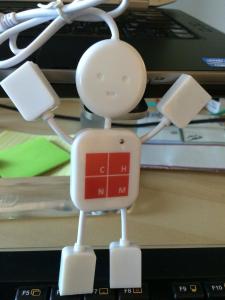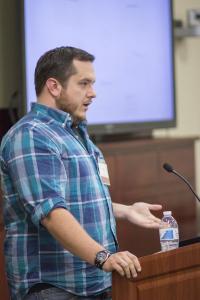On November 14 and 15, RRCHNM hosted a conference to commemorate its 20th anniversary. Current faculty, staff, and graduate students were joined by former members of the center and guests from throughout the United States. Over the two days, we enjoyed brief presentations and unconference-style sessions on a variety of topics.
Early this year, the graduate students at the center were asked to prepare a presentation for a panel on the topic of the Future of Digital History. Our task was to offer graduate student perspectives alongside other presenters. I was chosen (or volunteered) to present our collective perspectives.
In the intervening months, I collected feedback from various students about their experiences and asked them which topics seemed most important to discuss in the presentation. I received helpful input from a number of my colleagues, and we distilled those responses into a final few topics.
In the days leading up to the conference, I had not yet finalized my presentation. I was curious about how the conference would incorporate graduate students as participants and as labourers, and wondered whether the first day of sessions would influence my talk.
Throughout the first day and morning of the second day, the conference organizers acknowledged the hard work of the graduate students, and encouraged participants to include them in session discussions. I felt positively about that attentiveness.
On the afternoon of day two, I took my place on a panel alongside Tim Hitchcock, Kathryn Tomasek, and William Thomas. Fortuitously, we were ordered alphabetically, giving graduate students the final presentation of the day. The other speakers were wonderful, offering insightful critiques and useful comments about the places toward which digital history might next venture. Video recordings of our presentations can be found here.
I had finalized by presentation during the morning session. I thanked the conference organizers for their acknowledgements, and for the opportunity we were given to offer our perspectives. I told a brief anecdote about my path to digital history at Mason. And then I got to the heart of our message.
Our ideas had distilled into two primary topics: graduate student training and work and graduate student scholarship. I broke those two topics into sections:
Graduate Student Training and Work
- Graduate Student Work
- Although Graduate Research Assistants at the center enjoy better circumstances and more opportunities than most students, there are areas that can be improved
- Grad student work should be made more visible
- We should develop models to describe GRA work on CVs and resumes (GRA is opaque and often meaningless)
- We should encourage and support grad students to present about projects in professional communities
- The Digital History Fellowship
- Although it was intended for enrollment rather than training, Dr. Kierner and center staff adapted the funds to suit a training practicum
- The issues are still being ironed out (tuition waivers, continued training, etc)
- The fellowship is not available to current students
- But it has been renewed, which offers a new opportunity for improvement
- Digital Training
- Workshops and training institutes seem to have poor grad student attendance
- Costs in time and money are very high for students
- Internal opportunities for training are rare
Graduate Student Scholarship
- Digital Dissertations
- Guidelines are being drafted, but digital dissertations still present a risk for grad students
- There are disciplinary hurdles (at the committee level) and institutional hurdles (at the administrative level)
- The AHA guidelines should address dissertations in some way
- Finding Support
- There are few places on campus to find support for digital projects in classes
- Most digital projects completed for classes are abandoned or lost
- The Digital History Support Space was started in Fall 2013 by the DH Fellows, to provide support for students taking DH courses
I concluded my talk with the following points:
- The future seems bright for grad students in digital history, but the results are not inevitable
- We need to provide more funding and opportunities for training
- We need better models of acknowledgment for graduate student work
- We need better support mechanisms for digital projects at the student level
- We need more advocates for digital scholarship
The goal of my presentation was the contribute the perspectives of grad students to the conversations being held at the conference. I think that all grad students who have worked at the center would agree that our experiences are enviable for most of our peers. Yet we also believe that continual improvement is a worthy goal. We appreciate all of the people who have helped us reach this stage, and those people who continue to support and acknowledge our efforts. But we strive to improve the experiences of future graduate students, because someday they will be in our place.
The hope, perhaps, is to continue building a better yesterday by building a better tomorrow for current and future scholars.
Acknowledgements: For the conference, I received input from and spoke on behalf of Lindsey Bestebreurtje, Jordan Bratt, Alyssa Toby Fahringer, Sasha Hoffman, Ben Hurwitz, Jannelle Legg, Anne Ladyem McDivitt, Amanda Morton, Amanda Regan, Stephanie Seal, Ben Schneider, Nate Sleeter, Celeste Sharpe, and Jeri Wieringa.




















